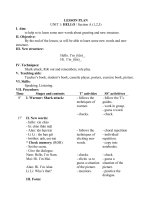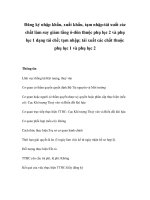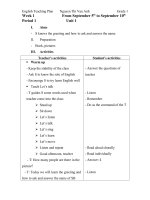Com READING 2 VB2 NTTHA WEEK 1 2
Bạn đang xem bản rút gọn của tài liệu. Xem và tải ngay bản đầy đủ của tài liệu tại đây (688.66 KB, 16 trang )
Subject: Reading 2
Course book: World Class Reading 1
Lecturer: Ngo Thi Thu Ha
Unit 1: It’s a new world record!
Lesson aims:
- To bring students general knowledge and vocabulary of world records.
- To enable students to know how to find the right meaning of words from context.
-
Lesson focus: Finding the right meaning from context.
Lesson‟s time allocation: 4 periods
Stages
Main contents
Time
Pre-Reading
Warm-up questions
Vocabulary preview exercises
Period 1
While-Reading
Identify main ideas
Arrange points of the reading
Post reading
Comprehension questions
Inference questions
Evaluation questions
Language- learning questions
Period 2
Vocabulary building exercises
Reading skill: Finding the right meaning from
context.
Period 3
Discussing questions
Crossword puzzle
Suggestion for homework
Period 4
1. Warm-up:
1.1: Warm-up questions
Activity 1:
1. Look at three photos above and what do you think are happening in each photo?
2. These are some examples of the world records. According to you, what is a world
record?
1/ 64
3. Have you ever heard of the Guinness World Records book? What do you know
about it?
1.2. Vocabulary preview
Activity 2: Guess the words’ meaning
Do the exercise in the course book p.p. 2-3
Activity 3: Put the following words which are taken from the reading in the right
category
brainchild
brilliant
thorough
reliable
slim
arguments
unique
wacky
stacked
enormous
venomous
Activity 4: Match opposite words with each other:
1. thorough
a. common
2. enormous
b. untrustworthy
3. venomous
c. tiny
4. wacky
d. harmless
5. slim
e. thick
6. brilliant
f. stupid
7. unique
g. normal
8. reliable
h. incomplete
2. While you read:
2.1. Identify main ideas
Activity 5: Read the text quickly (from beginning to the end) and choose the best
one to complete the following sentence.
The record focused on this passage is ____________
a. Christian Adam‟s ability to ride his bicycle 60.45 kilometers while playing the
violin.
b. The Taiwan museum.
c. Guinness World Records book.
Activity 6: There are seven points discussed in the reading passage. There is one
point for each paragraph. While you read, put the points in order from 1 to 7
(exercise in the course book p.4])
2.2. Understanding the reading
2.2.1. Comprehension questions
Activity 7: Choose the correct answer for the multiple-choice questions in the course
book p.7-8.
Activity 8: Read the passage and complete sentences
1. ______________________ the name Sir Hugh Beaver known around the world.
2. Sir Hugh‟s brilliant idea was about ____________________________________
3. Guinness World Records been sold in____________ countries and in
_____________languages.
2/ 64
4. The book holds a record of its own because _____________________________
5. People use Guinness World Records book to ____________________________
6. ____________ and ______________ of Taiwan museum make it the unique
museum.
7. Primetime is _____________ where you can also watch Guinness World Records
8. Growing hair to a record length and holding the biggest party are two examples of
records that ________________.
Activity 9: T/ F statements
1. The first Guinness Records book in the United States was published in 1954. T/ F
2. Guinness World Records book has sold more copies than any other book. T/ F
3. The information of records was updated annually. T/ F
4. Reading Guinness World Records book is the only way to get information about
records. T/ F
5. You can break a world record yourself even if you are not strong or fast. T/ F
6. Every time you break a record, your name will be included in the book‟s pages.
T/F
2.2.2. Inference questions:
Activity 10: Answer the following questions:
1. What does the word “it” in line 3, paragraph 1 refers to?
2. What is a reference book?
3. Why did Sir Hurg decide that “a thorough, reliable guide to records was needed”?
4. Sir Hurg “liked the idea that this guide would indirectly promote Guinness
products”. Why did he think so?
5. What might be Guinness‟ products? How do you know?
6. How many kinds of records are divided in this passage?
7. Why has Guinness World Records been called the world‟s most readable book?
8. What can be inferred when the writer says “be careful! The Guinness Corporation
takes no responsibility for accidents or injuries that occur when you making your
record-breaking attempt.”?
2.3. Language learning
Activity 11: Find one word from the reading for each explanation below.
Para. 3:
1. to protect, keep the same record: _______ record
2. not including: __________
Para. 4:
3. be easy to read: ____________
4. to separate into parts, sections: ____________
5. discussions involving different point of views: _____________ and
____________
6. to achieve record: ___________ record
7. toward the back, the opposite of “forwards”: _____________
Para. 5:
8. to look like: _______________
Para. 6
9. much, a lot of: _______________
3/ 64
Para.7
10. formally: _________________
Activity 12: Fill in the blanks in the incomplete sentences with one of the words
from the reading. (exercise in course book p.8-9)
3. Reading skill: Finding the right meaning from the context
3.1. Tip:
- You can often find the meaning of the word from the sentence or paragraph where
you can see the word ([1], p.9)
- Draw upon the important clues in the sentences that appear directly before and
after the unfamiliar word or passage. Punctuation can help you decipher
unfamiliar words: ([2], p. 37)
3.2. Practice
Activity 13: Do the exercise in the course book p. 10-11
Activity 14:
1. In which of the following sentences does the word “volume” mean “amount”?
a. I cannot hear the CD clearly; can you turn the volume up a little?
b. Some workers leave their work as they cannot stand the huge volume of work
here
c. Harry Potter and the Philosopher’s stone is the first volume in a J. K
Rowling‟s series of seven books.
2. In which of the following sentences does the word “hard” mean “not soft, solid
and firm to tough”?
a. Some of questions in the English test are very hard that few students can do.
b. The plastic was chosen to make this product because it is very hard and
durable.
c. She is a hard student so she can pass the exam easily.
3. In which of the following sentences does the word “balance” mean “the amount
of money remaining after making a part of a payment”
a. You pay deposit now and the balance in 12 months.
b. He is trying to balance in a rope.
c. People use a balance for weighing.
4/ 64
4. In which of the following sentences does the word “backwards” mean “out of
date”.
a. Now, let‟s count backwards from ten to one
b. I glanced backwards over my shoulder to see if anyone was following me.
c. Since the overthrow of the president the country has moved backwards.
5. In which of the following sentences does the word “set” mean “a group of things
of the same type that belong together”
a. I need a set of tool for repairing vehicle.
b. Remember to get up early. I think you should set your watch one hour earlier.
c. She sets the baby on the floor to play.
4. Post-reading:
Activity 16: Evaluation/ Discussion questions:
1. If you could set a world record in any field, what field would you choose
2. Discuss to give other examples of records that you can break if you like.
3. Have you ever visited the Guinness Internet Web site or watched any TV show
about wacky records? Tell about the wacky records that you know.
4. Some people believe that the Guinness World Records Book encourage people to
do dangerous things. Should Guinness publish these kinds of records? Give
reasons for your opinion.
Activity 17: Crossword puzzle: Do exercise in course book p.13.
5. Homework:
Exercise 1: Use the key words “Guinness World Records” to search for the Guinness
website. Browse through the records to see if any world records set by Vietnamese
people. Write several sentences about these records if have.
Exercise 2: Choose the appropriate definitions for the underlined words. Write the
number in the space provided.
1. mean
a. not generous
b. average
c. to intend
___ I mean to compliment you on your work this afternoon.
___ He is too mean to give such a large donation.
___Your task now is to calculate the mean distance that this car has just travelled.
2. check
a. to examine, inspect
b. a written order directing a bank to pay money as therein stated.
c. to mark to show that
___ Please check the sentence that you think is correct.
___ He checked the contents of the package carefully
___ Can I pay by check?
3. break
a. to separate something into pieces by hitting or dropping it.
b. a time for rest or vacation.
c. to fail to obey the rule or law.
5/ 64
___ They usually go shipping during their lunch break.
___ If you break the speed limited, the penalties are severe.
___ Someone had broken the window to get into his house.
4. official
a. someone with an important position in an organization
b. formal
c. be announced publicly
___ You must use the official language to write business letters.
___ It is official that the princess is to marry next year.
___ A government official said that there would be a new financial policy to settle
economy‟s crisis.
5. consume
a. to eat or drink
b. to use up
c. to destroy
___ The entire apartment was consumed by fired.
___ Before he died he had consumed a large quantity of alcohol.
___ Typing his boss‟s correspondence consumed most of the secretary‟s time.
Exercise 3: Choose the correct meaning of the underlined word.
1. Tenants over 62 can supply for benefits at the Office of Housing for the Elderly.
a. poor
c. people who need aid
b. people over 62
d. people who need housing
2. If you don‟t get that furnace repaired before winter, we will freeze to death.
a. fire escape
c. water container
b. heater
d. staircase
3. Since landlords get reimbursements for rents raises for the elderly, they shouldn‟t
complain about losing money.
a. bills
c. payments
b. Increases
d. housing benefits
4. The elderly are not excluded from rent raised that all tenants have to pay when the
landlord makes a major improvement.
a. obliged
c. excited
b. included
d. eliminated
5. When their rent increased from $200 to $400, they protested against such a
tremendous increase.
a. light
c. huge
b. difficult
d. tiring
6. Because the city is slow in processing applications, many of the elderly do not get
housing benefits.
a. providing
c. raising
b. working on
d. trying
7. The landlord notified his tenants that their rent would be increased the following
month.
a. janitor
c. occupants
b. friends
d. poor people
8. Reading a daily newspaper will make you aware of what is going on in the world.
a. knowledgeable
c. alike
6/ 64
b. ignorant
d. dependent.
9. The consensus among his sisters was that he ought to get married.
a. agreement
c. statistics
b. survey
d. concentration
10. Because their birthdays occurred in the same month, they shared a birthday party.
a. celebrated
c. merited
b. spared
d. experienced together
Exercise 3:
When a death occurs, the family has religious, social, and legal
responsibilities. If the deceased has left an explicit of papers in an accessible
file, arrangements will be much easier for the family to make. For example,
such papers should include the deed for a burial plot (if there is one), a
statement as to whether cremation or burial is desired, a copy of the birth
certificate, and the names and addresses of all family members and friends
who should be notified. Furthermore, the papers should include information
on bank accounts, safe deposit boxes, and insurance policies, as well as the
will. The person in charge of the funeral will need to know how much money
is available in order to determine the expenses he or she may reasonably incur
for the family.
If feasible, the person who makes the funeral arrangements should not be one
of the bereaved. A melancholy widow may not be able to make objective
discussions regarding expenses, such as for coffin. Whoever makes the funeral
arrangements realizes that he or she is deputized to make legally binding
contracts with a funeral director or others, which will probably be honored
some months later when funds from the estate are released.
One of the duties of the person in charge of the funeral is to prepare a death
notice. Included in the information should be the date of death, the names of
family members, and the time and place of the forthcoming interment.
A. General comprehension: Answer the following questions
1. The main idea of paragraph 1 is that
a. funerals are melancholy occasions
b. everybody should leave a will so that survivors will know how much
property they inherit
c. everybody should put important papers together for his or her survivors
d. all friends and relatives of the deceased would be advised of the funeral
arrangements.
2. The supporting details of paragraph 1
a. give instructions about making funeral arrangement
b. specify the types of papers required to make funeral arrangements simpler
c. explain why a birth certificate in an important requisite for a death
certificate
d. none of above
3. The main idea of paragraph 2 is
a. in the first sentence
b. implied
c. in the last sentence
7/ 64
d. not clearly stated
4. The supporting details in paragraph 2
a. tell why widows spend too much on funeral arrangements
b. explain the duties of a funeral director
c. emphasize the unpleasant nature of funeral arrangements
d. explain why a disinterest person should make funeral arrangements
5. What is the main idea of paragraph 3? Is it stated or implied?
_______________________________________________________________
_______________________________________________________________
6. List the supporting details of paragraph 3
_______________________________________________________________
_______________________________________________________________
B. Vocabulary work: Read the following text and choose the best answer to
complete each statement.
1. A deceased is ___________
a. missing person b. dead person
c. wealthy person d. relative person
2. The opposite meaning of the word “explicit” is ___________
a. vague
b. exciting
c. irregular
d. clear
3. The word “accessible” in this reading means ___________
a. acceptable
b. accessory
c. reachable
d. probable
4. The word “deed” in this reading refers to ______________
a. actions
b. legal papers
c. will
d. addresses
5. “incur” in this reading is closed in meaning to ______________
a. inquire
b. pay
c. acquire
d. change
REFERENCES
[1] Bruce Rogers, World Class Reading 1, 1st .e.d, McGraw Hill ESL/ ELT. New York,
USA, 2005.
[2] Chesla, Elizabeth L., Reading Comprehension Success in 20 minutes a day, 4th .e.d,
Learning Express New York, United States, (2009)
Unit 2: Meet Koko
Lesson aims:
- To bring students general knowledge of an animal with special abilities like
human.
- To enable students to identify word forms
Lesson focus: Identifying word forms
Lesson‟s time allocation: 4 periods
Stages
Main contents
Pre-Reading
Warm-up questions
Vocabulary preview exercises
Time
Period 1
8/ 64
While-Reading
Post reading
11.
Identify main ideas
Arrange points of the reading
Comprehension questions
Inference questions
Evaluation questions
Language- learning questions
Period 2
Vocabulary building exercises
Reading skill: Identifying word forms
Period 3
Discussing questions
Crossword puzzle
Suggestion for homework
Period 4
Warm-up:
1.1: Warm-up questions
Activity 1: Discuss some questions.
1. Do you believe that some animals can communicate with people? Why or why
not?
2. Koko is probably the most famous gorilla in the world. What does the photo of
Koko above tell us about her?
3. Right-click the below icon packager shell object object activate contents
to watch a clip about Koko and then talk about Koko‟s special abilities and
characters in this clip.
Koko.flv
1.2. Vocabulary preview
Activity 2: Guess the words’ meaning
Do the exercise in the course book p.p. 15-16
Activity 3: The following words are taken from the reading. Put them in the correct
column of the charge to show their part-of-speech
9/ 64
remarkable
curiosity
sentimental
Noun
directly
consider
communicator officials
natural
combine
affectionate
correctly
sickness
previously movements
emphasis
Adjective
Verb
Adverb
1. While you read:
1.1. Identify main ideas
Activity 4: Read the whole passage very quickly and complete the following
statements
a. This reading is mainly about ___________________________________________
Activity 5: There are ten points discussed in the reading passage. There is one point
for each paragraph. While you read, put the points in order from 1 to 10 (exercise in
the course book p.17)
1.2. Understanding the reading
2.2.1. Comprehension questions
Activity 6: Choose the correct answer for the multiple-choice questions in the course
book p.18-19
Activity 7: Use the information in the reading to complete the following form about .
1. Full name:__________________________________
2. Called name:
3. Date of birth: _______________________________
4. Place of birth: _______________________________
5. Appearance: ________________________________________________
6. Weight: ____________________________________________________
7. Gender: ____________________________________________________
8. Species: ____________________________________________________
9. Abilities: ___________________________________________________
___________________________________________________
___________________________________________________
10. Personal characters: __________________________________________
11. Coach: _____________________________________________________
Activity 8: True/ False
1. Koko is very famous. T/ F
2. Koko can draw. T/ F
3. Patterson was allowed to work with Koko when Koko was three months old. T/ F
4. Koko communicate with human only by making sound __________
10/ 64
5. After being taught ASL for about two months, Koko could communicate by
signing. T/ F
6. Koko can make single signs only. T/ F
2.2.2. Inference:
Activity 9: Answer the following questions
1. Why is Koko said to be a celebrity?
2. “Koko‟s resume is impressive for anyone, but it is even more remarkable when
you consider that Koko is a 125 kilogram female gorilla.” What is implied in his
saying?
3. Can Koko sign the sentence “I love All Ball cat very much”? Give your
explanation.
4. List out some evidences proving that Koko is very special.
5. “Gorrilas may look fierce, but they are actually gentle, intelligent animals”. In
other words, it can be understood that __________________________________
_________________________________________________________________
1.3. Language learning:
Activity 10:
1. What does the “their permission” refer to?
2. Find in para. 5 one verb that is closed in meaning to “leave out”
3. Some nouns in English can be formed by using V ended with –ate + tion
Ex: communicate + tion communication
V
N
Find at least 5 other examples of this word formation
4. Some nouns in English can be formed by using V + ment
Ex: improve + ment improvement
Find in the reading one noun that has the same form.
Give at least 5 other examples of this word formation.
5. Some nouns and verbs in the reading have the same form.
Ex:
Verb
Noun
love
love
Find 3 examples in the reading and 5 other examples outside the reading that have
the same word formation.
6. Find an adverb phrase in para.8 which means “repeatedly”
7. In para.8, “more and more emphasis” means “emphasize at a continually
increasing rate”. Translate the sentence “Ông ta kiế m đươ ̣c càng ngày càng nhiề u
tiề n” into English.
8. Do the word “compound” in para.8 and the word “compound” in para.9 have the
same meaning? If not, explain the differences.
9. What does the word “anyone‟ in the last sentence of para. 10 refer to?
Activity 11: Fill in the blanks in the incomplete sentences with one of the words
from the reading. (exercise in course book p.20)
11/ 64
2. Reading skill: Identifying Word Forms
2.1. Word forms:
- Many words in English have several forms. There may be a noun form, a verb
form, an adjective form, an adverb form (although not every word has all of
these forms), and sometimes others. Recognizing word forms can improve your
reading comprehension and expand your vocabulary. If you recognize one word
form (such as the adjective independent) you will recognize others (such as the
noun independence or the adverb independently) [1]
- Typically suffixes indicate the function of a word in a sentence. For instance
there are some suffixes that are used only for nouns and others that are used for
verbs, adjectives and adverbs. [2]
- The particular suffix used in forming a word also helps to give meaning to a
word. [2]
Ex: „competition‟ and „competitor‟ are both nouns that are formed from the verb
„compete‟. The „-or‟ suffix, however, indicates that there is a person performing
the action, whereas the „-tion‟ suffix indicates a condition or state of being.
- Do note, that some suffixes are used with more than one type of word, so on their
own they cannot be used to infer the function of the word in the sentence. In
those situations, other context clues are needed to provide the function of that
word in a particular sentence. For instance „-ing‟ suffix occurs with nouns, verbs
and adjectives. [2]
Ex: Teaching is interacting with interesting people,”
Gerund
Verb in the
present
progressive
tense
adj
Noun endings [2]
Ending
Usage
Example
-al
-ance/-ancy/
-ence/-ency
-ation
-ice
-er/-or
the act of doing, or the state of
relating to quality, state or condition
-graph
-ian
-ing
-ism
-ist
-ity
a writing or record
person or thing
having the quality of (gerund ending)
action or practice, theory or doctrine
one who, or that which does or has to do with
state, condition or quality
-ization
nouns formed from verbs; condition, act,
process
the product or result of; the means of
betrayal, refusal
performance, infancy,
prominence, urgency
creation, reformation
cowardice, notice
teacher, worker,
competitor, legislator
telegraph, polygraph
politician, amphibian
teaching, working
nationalism, Hinduism
nationalist, typist
inferiority,
confidentiality
modernization
urbanization
achievement,
-ment
action or process of; result of
condition, quality or act
person or thing that performs the action
12/ 64
-ness
-ogy
-oid
-ory
-ship
-sion/-tion
government
relating to quality, state or condition
happiness, sadness
the study of
biology, geology
like, resembling
humanoid, android
a place for the action of the verb stem
dormitory, repository
the state, condition or quality of; art or skill of friendship,
marksmanship
action or process of; condition or state of
rejection, completion,
being; result of
connection
Verb Endings [2]
Ending
-ate
-ed
-en
-er
-fy
-ing
-ise/-ize
-s/-es
Usage
verbs from some Latin forms
forms the simple past and past participle of
regular verbs
verbs formed from adjectives
verbs with a habitual or repeated action
cause to be or become
present participle and part of progressive
tenses
to cause to become, resemble; make into; to act
in the manner of
ending of third person singular, present tense
Example
fascinate, participate
walked, has walked
soften, weaken
stutter, canter
beautify, liquefy
walking, is walking
authorize, sympathize
walks, runs
Adjective endings [2]
Ending
-able/-ible/
-al
-ant
-ed
-ent
-er
-est
-ful
-ic
-ing
-istic
-ite
-ive
-ory
-ose
-ous/-ious
Usage
capable of, fit for, tending to, likely to
relating to, having the nature of
in the act or process of doing
adjectives formed from nouns
having the quality of
comparative ending
superlative ending
full of, characterized by
pertaining to, connected with, resembling
participial form as an adjective
having the qualities of, formed from
derived from some Latin verbs
having a tendency to or the nature of
a place or instrument for doing the main
element
full of; like
full of; having the qualities of
Example
trainable, flexible
musical, personal
vigilant, militant
interested, bored
dependent, confident
bigger, faster
biggest, fastest
beautiful, bountiful
volcanic, angelic
interesting, boring
realistic, socialistic
infinite, polite
attentive, massive
laboratory, dormitory
verbose, grandiose
poisonous, anxious
13/ 64
Adverb endings
Ending
-ally
-ly
Example
comically
quickly
Activity 12: Do exercise 1 in the course book p.24
Activity 13: Do exercise 2 in the course book p.p 24-25
Activity 14: Match the root words with suitable suffixes
Root word
suffix
1. long
a. -en
2. child
b. -ous
3. develop
c. -al
4. class
d. -th
5. danger
e. -hood
6. cloud
f. -ment
7. economic g. -y
8. sense
h. -ify
9. electric
i. -ian
10. sharp
j. -ible
3. Post-reading:
Activity 15: Evaluation/ Discussion questions:
1. If you see a person with piercing eyes, are you afraid of him?
2. Do you often judge people by their appearance? Why or why not?
3. Have you ever seen any other animal that can communicate with human like
Koko?
4. Do you think that animals also have emotion?
5. Imagine that one day you could be able to interview Koko, prepare a list of
questions that you would like to ask.
Activity 16: Crossword puzzle: Do exercise in course book p.24
4. Homework:
Exercise 1: Choose the correct word for each blank
1. comfort / comfortable / uncomfortable / comfortably / discomfort
a. A lot of small cars are not built for __________.
b. They were very __________ when they lived in a small apartment.
c. I love this hotel; it is very _________ to stay here.
d. You can sit very __________ in this car.
2. politics / political / politically / politician
a. I disagree with many of my father‟s _____________ ideas.
b. Alex is interested in _____________.
c. _____________, he tends to be rather conservative.
d. He is a talented _______________.
14/ 64
3. possibility / possible / impossible / possibly / impossibility
a. There‟s no _____________ for her to pass the final exam.
b. I‟m really sorry; it is not ______________ for me to help you now.
c. _____________ my friends will come to visit me next Saturday.
d. My neighbors gave a part last night and it was ______________for me to
sleep because of the noise.
4. grows / growth / growing / grew
a. Solar energy is a __________ industry.
b. The __________ of solar energy will increase in the next few years.
c. If the solar energy ___________, people may not have to depend so much on
oil for energy.
d. He ___________ this tree ten years ago.
Exercise 2: Supply the correct form of the words in brackets.
1. Caesar has become the (pride) __________father of several thousand children,
who all need good homes to go to!
2. „Are you all right?‟ Laura nodded (dumb) _________.
3. The exhibition has (stimulative) _________interest in her work.
4. This is probably one of the most (photography) _________fishing villages you'll
find anywhere in the world.
5. The lake is (surrounding) __________with trees.
6. He was born (able) _________.
7. At times we became too (demonstrate) __________, perhaps when a lady visitor
had called to see Grandmother.
8. Over, and over, and over again, until you're (deaf) _______by the noise.
9. The buildings have been designed to blend in with their (surround) _________.
10. The great bands always seem to make it look (effort) _______, like the easiest
thing in the world.
11. We have the (able) ________to create whatever we want.
12. We take great pleasure in being able to (exhibition) _______ these paintings on
our web site to reach the wider audience they deserve.
13. Richmond Town Hall will host the (photography) ________ exhibition, showing
the 2nd Battalion between 1952 and 1956.
14. Coffee and tea are mild (stimulate) _______.
15. He qualifies for help on the grounds of (able) ________
Exercise 3: Identify and correct all word form errors in the following sentences.
1. The student finished her apply in three hours.
2. The package was send yesterday.
3. Most athletes feel terribly after losing.
4. This essay will introducing two new issues.
5. The man could not concealing his anger.
6. The film evoked a powerfully response from the audience.
7. After seven hours of writing, he finally finished his compose.
8. My father always told me to tell the true.
9. The report indicated a growing rate of 11% in the first fiscal year.
10. The company recovered quick from the recession.
11. After several hours of negotiate, the two leaders finally reached an agreement.
15/ 64
12. I decided to sale my care.
13. The store was not opening at lunch time.
14. The couple decided to separating.
15. When Tom‟s manager questioned his competent, Tom quitting.
16. All of Tom‟s colleagues were happily to see him returning.
17. This exercise is difficulty.
18. The new year began with the replace of three key employees.
19. The new worker seemed very comfort with her new appointment.
20. Most immigrants try to maintaining their traditional.
21. The police force works to protection people‟s livings.
22. Mark is a very skill mechanic.
23. Most students don‟t like having to be testing.
24. To controlling costs, the company decided to changing suppliers.
25. I hope to improve my write skills.
REFERENCES
[1] Bruce Rogers, World Class Reading 1, 1st .e.d, McGraw Hill ESL/ ELT. New York,
USA, 2005.
[2] Patricia Ackert, Anne L. Nebel, Concept & comments, 2nd. e.d, Houghton Mifflin
Harcourt P. Massachusetts 02116, USA, 1997
16/ 64









